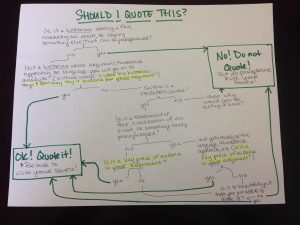And now the semester is over, and my methods course is over and done with. Another group of budding young historians is all ready for whatever research comes their way (I hope). This semester, I’ve been using my posts to talk about the progress of the course from its conception, how I teach footnotes, in-class research exercises, and peer review. In this post, I’ll talk about our end-of-semester wrap-up discussion and the issue of quotations in student research papers.
As I read over the drafts of my students’ research papers, I found myself commenting on one writing issue over and over again: quotations. There were different types of issues with quotations. Some students needed to work on how to incorporate quotes into their own writing. There were lots of block quotes. Most students needed to think about how and when to quote at all in the first place. Multiple papers included overly long quotes of things that really didn’t need quoting at all. Some papers quoted historians using theoretical concepts or introducing characters that then didn’t come up in their own papers. These issues were incredibly common, and if I think about it, they are issues I see in papers across multiple courses I teach.
Quotations are a tricky thing to master. Quote too little, and it might seem like you haven’t read or don’t have evidence to back up you assertions. Quote too much, and a paper reads like a copy-and-past compilation of other people’s words. Striking the right balance can be hard, especially when getting your bearings on claiming your own authority as a writer.
As I was thinking about how to talk to them about troubleshooting some of the most common issues I came across, I made them a flowchart. (By hand. I’m sure that I could do this much prettier on the computer, butI like making things harder than they have to be, apparently.) In case your students have similar issues, I will share it here:
The big thing I tried to get them to think about was pretty simple. You should quote sources that are going to help you advance your argument. What was frustrating in some of the drafts (and again, this is really common in my experience) is seeing students quote materials that don’t seem necessary for their argument. Instead, they seem to be quoting for the sake of quoting, not trusting themselves to paraphrase the information that they need and relying on the authority of the published author to make their point. But now they’re the author, and they have to work on writing as the authority figure themselves. I reminded them: you’ve done the research, you know the stuff. Your job now is to bring in the information you need and to present it to your reader to support the argument that you’re trying to make.
I am happy to report that in their revisions, many of the students took this to heart and turned in wonderful final papers.




